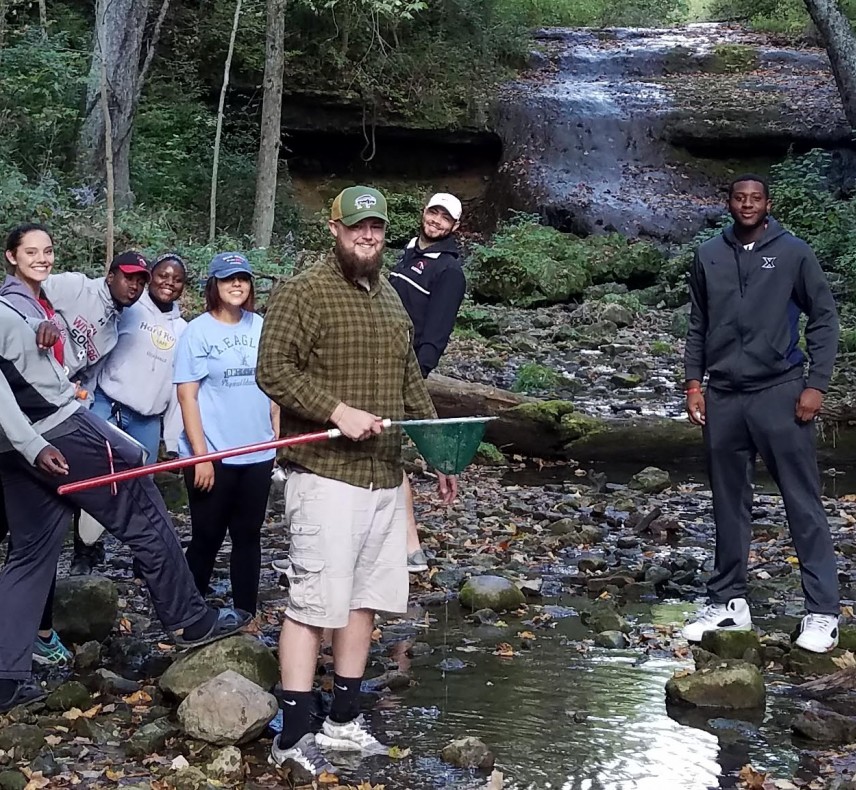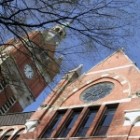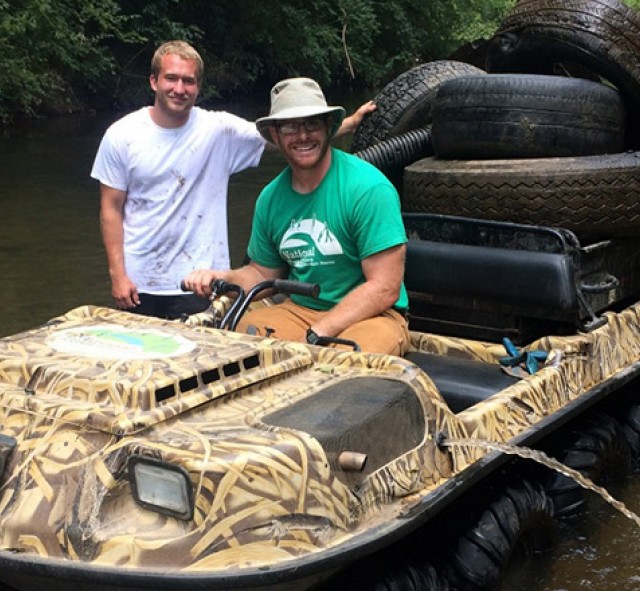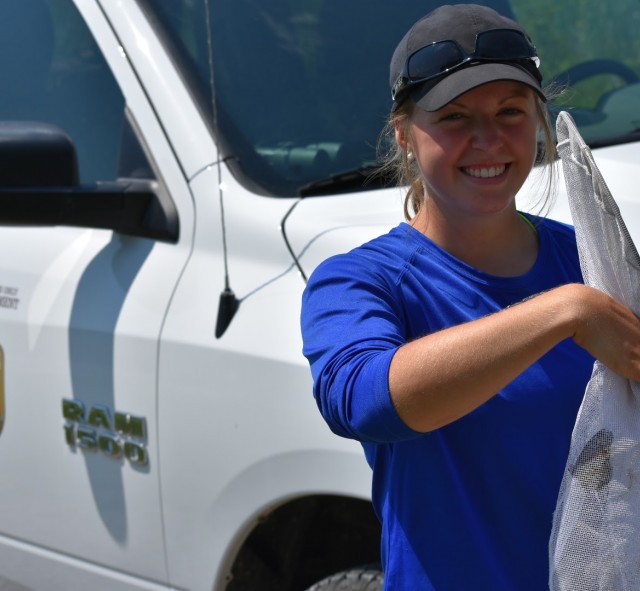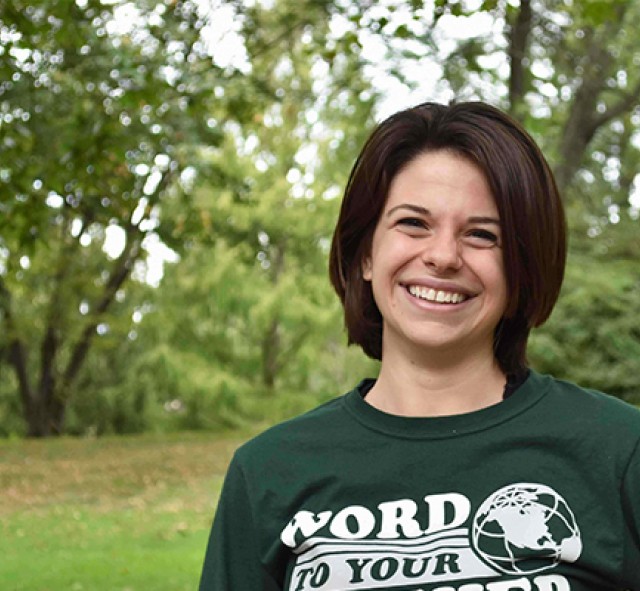The Association of American Colleges and Universities (AAC&U) has named Wittenberg University among only 22 institutions across the country that are providing models for how to make civic learning and democratic engagement an expectation for all students who major in a specific discipline. The announcement was made Oct. 25 and specifically praises Wittenberg’s Environmental Science and Geology Departments for their leadership in this area.
“Our Environmental Science and Geology Departments have been leaders in providing hands-on learning opportunities that connect students’ work in the classroom with real-world issues,” said Provost Mary Jo Zembar. “We are thrilled by this recognition as it affirms our efforts, and we are thankful for Sarah Fortner, associate professor of geology and environmental science, for her leadership in making civic learning and democratic engagement a cornerstone of both departments.”
Supported by a grant from the Endeavor Foundation, the AAC&U initiative aims to limit the civic-free zones of too many departments by providing guidance to colleges and universities as they tackle one of their most resistant, yet fertile, areas of civic learning by bringing it squarely into where students invest most of their academic attention: their majors.
“I'm excited to see the work of our students in the community highlighted,” Fortner said. “Our courses are designed to inspire students to continue to support their communities. They also provide direct training for future work on earth and environmental challenges. We are grateful to our many community partners and the growing linkages between class, internships, and decision-making in our community. These are rich experiences for our students. We are also thankful to the NSF InTeGrate Project for showing us how to design around shared goals for our students and the Springfield Community. We have been lucky to collaborate with many faculty across disciplines to the benefit of our students.”
The 2012 report, “A Crucible Moment: Civic Learning and Democracy’s Future,” found that most civic-oriented study occurs in the first two years of a student’s academic career and then shrinks demonstrably as they move into more concentrated academic study. One of the recommendations in “A Crucible Moment” calls on colleges and universities to “define within departments, programs, and disciplines the public purposes of their respective fields, the civic inquiries most urgent to explore, and the best way to infuse civic learning outcomes progressively across the major.”
AAC&U took up this challenge through a pilot initiative that resulted in the 2015 publication of Civic Prompts: Making Civic Learning Routine Across the Disciplines by Caryn McTighe Musil. Civic Prompts constructs a process for faculty members to hold deep conversations with their departmental colleagues to explore on their own disciplinary terms how best to make civic learning unavoidable. This new grant enables AAC&U to offer concrete models of what that actually looks like in practice.
McTighe Musil, senior scholar and director of civic learning and democracy initiatives, and director of the Civic Learning in the Major by Design project, was impressed by the creativity and variety of ways that the selected departments used a civic lens to enhance the design of the major.
“These civic-rich departmental designs seek to increase students’ comprehension of their discipline’s investigations, enhance voice and agency, offer hands-on practice in collaboratively addressing challenging public problems, and introduce students to moral, ethical, and civic responsibility issues that are likely to be part of their professional lives,” McTighe Musil said.
The grant from the Endeavor Foundation will also support national dissemination of some of the exemplary models through (1) a session at AAC&U's 2018 annual meeting to be held Jan. 24-26 in Washington, DC; (2) a webinar in March 2018 for departments wanting to learn more about how to craft civic departmental designs; and (3) seed grants to support departments in their efforts to incorporate public questions, consequences, issues, and pedagogies into their major requirements.
Wittenberg’s Environmental Science and Geology Departments will be featured on AAC&U’s website. Joining Wittenberg on the site are:
- Clark University (Massachusetts): Community, Youth, and Education
- California State University–Monterey Bay (California): Human Communication
- Emory & Henry College (Virginia): Civic Innovation
- Fort Hays State University (Kansas): Leadership Studies
- Gustavus Adolphus College (Minnesota): Communication Studies
- Illinois State University (Illinois): School of Communication
- Middlebury College (Vermont): Environmental Studies
- Syracuse University (New York): Program on Citizenship and Civic Engagement
- Texas Lutheran University (Texas): Social Innovation and Social Entrepreneurship
- University of Maine at Machias (Maine): Psychology and Communication Studies
- University of Miami (Florida): Public Health
- Weber State University (Utah): Social Work
- Wittenberg University (Ohio): Environmental Science and Geology
Nine other institutions and departments will be featured as case studies in Peer Review. They include:
- Bates College (Maine): Environmental Studies
- James Madison University (Virginia): Nursing and Social Work
- Lehigh University (Pennsylvania): English
- Providence College (Rhode Island): Public and Community Service
- Saint Mary’s College of California (California): Justice, Community, and Leadership
- Texas Woman’s University (Texas): Chemistry and Biochemistry
- University of Puget Sound (Washington): African American Studies
- University of Tennessee, Knoxville (Tennessee): Sociology
- Willamette University (Oregon): Civic Communication and the Media
For more information about the project, visit http://www.aacu.org/civic-prompts
About AAC&U
AAC&U is the leading national association concerned with the quality, vitality, and public standing of undergraduate liberal education. Its members are committed to extending the advantages of a liberal education to all students, regardless of academic specialization or intended career. Founded in 1915, AAC&U now comprises nearly 1,400 member institutions—including accredited public and private colleges, community colleges, research universities, and comprehensive universities of every type and size.
AAC&U functions as a catalyst and facilitator, forging links among presidents, administrators, and faculty members who are engaged in institutional and curricular planning. Its mission is to reinforce the collective commitment to liberal education and inclusive excellence at national, local, and global levels, and to help individual institutions keep the quality of student learning at the core of their work as they evolve to meet new economic and social challenges.
Photo: Environmental science students partner on a public outreach event with National Trails Parks and Recreation District and the U.S. Fish and Wildlife Service. Photo by Amber Burgett.


